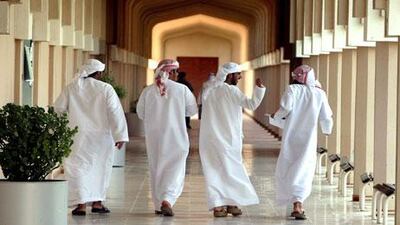The story of Abu Dhabi's drive to diversify its economy and grow the private sector is usually told through the blockbuster investments that form the building blocks of the strategy: things such as General Electric's US$8 billion (Dh29.38bn) commercial finance joint venture with Mubadala Development, or the Tourism Development and Investment Company's (TDIC) plans to develop Saadiyat Island into a cultural haven, complete with branches of the Louvre and Guggenheim museums.
While fascinating and dramatic, that narrative is incomplete.
The proper context for understanding the tale of Abu Dhabi's growth involves an intersection of economics and demographics. It's about people. More than half of Abu Dhabi's population of Emiratis is below the age of 20, a 200,000-strong group of young people preparing to enter the workforce in the next couple of decades. They need skills, jobs and the chance to rise into positions of leadership.
Though often lost in stories about Abu Dhabi's development, that issue is a crucial factor in the emirate's economic planning. With the coming influx of nationals into the workforce, a question for the Government has become how to transition away from a society in which the Government serves as the employer of choice for nationals and towards one dominated by a thriving private sector led by the best and brightest Emiratis.
This transition has to happen partly because the Government, despite its enormous oil wealth, cannot afford to employ all the Emiratis entering the workforce in the coming years. Even if the Government could give everyone jobs, simply adding workers would only compound inefficiencies at its departments while perpetuating the expectation of reliance on the Government for financial needs.
"The public sector is becoming incapable of automatically employing every new age cohort entering the labour market and a shift in the social contract is inevitable," as a group of UAE University academics put it recently in the results of the largest survey yet of university-age Emiratis on their attitudes towards work.
Yet even amid this shift in ethos, we have continued to tell Abu Dhabi's modern story as one of isolated ambition, as though the emirate were transforming itself for no other reason than the logic of economics. Oil is going to run out 100 years hence. Therefore, Abu Dhabi needs to prepare for the time when the cascade of black gold slows to a trickle.
There is, to be sure, an element of that in what Abu Dhabi is doing through its Economic Vision 2030, which explicitly says development "is intended to reduce the relatively high dependence on oil and the cyclical swings that accompany it". The inevitable shift to renewables is also clearly something Abu Dhabi is addressing through Masdar, a carbon-neutral city and innovation centre under construction next to the airport.
But Abu Dhabi's landscape-transforming developments and big partnerships in reality have little to do with oil running out. Nor are they the products of plain ambition or development for the sake of development.
At the true heart of the capital's development story are organisations such as Mubadala Development, a strategic investment company owned by the Abu Dhabi Government, which is tasked with developing the private sector in partnership with global business titans such as GE.
"One of the things I want to highlight is people," said Waleed al Muhairi, Mubadala's chief operating officer, at a press conference last week about the company's partnerships with GE, which include an aircraft parts manufacturing business, the $8bn commercial finance joint venture and a training institute for executives.
"And the point I want to make there is that one of the things we've done is we've taken fantastic young and middle managers in our office from Abu Dhabi and the rest of the UAE who are now cycling through the GE system, and they're taking programmes that middle managers within GE are teaching and would take themselves as they progress through a career," he said.
"Business achievements aside, frankly speaking I'm most proud of the people development side, and GE has been fantastic in opening itself up with its capabilities to ensure that some of our best and brightest are able to cycle through what really are world-class programmes in GE."
That side of the story - how Mubadala's partnership with GE intersects with the development of a skilled Emirati workforce - was absent from reports on the event, including the coverage in The National. The omission was understandable insofar as there were bigger stories to work on that day, including the announcement by Mubadala GE Capital that the venture had arranged $2bn worth of loans since it started up last year. Articles about executives getting training also admittedly are not the juiciest of yarns.
For those reasons, the overlap of demography and economics is difficult to weave into every story. Yet it would be unfortunate if we continue to skip over such an important contextual chapter in the narrative of Abu Dhabi's growth. Mubadala's raison d'etre, arguably, isn't to make big investments. It's to make big investments that further the Government's aim of developing the private sector and training young Emiratis to become productive members of it. Without that understanding, we're missing the point.

